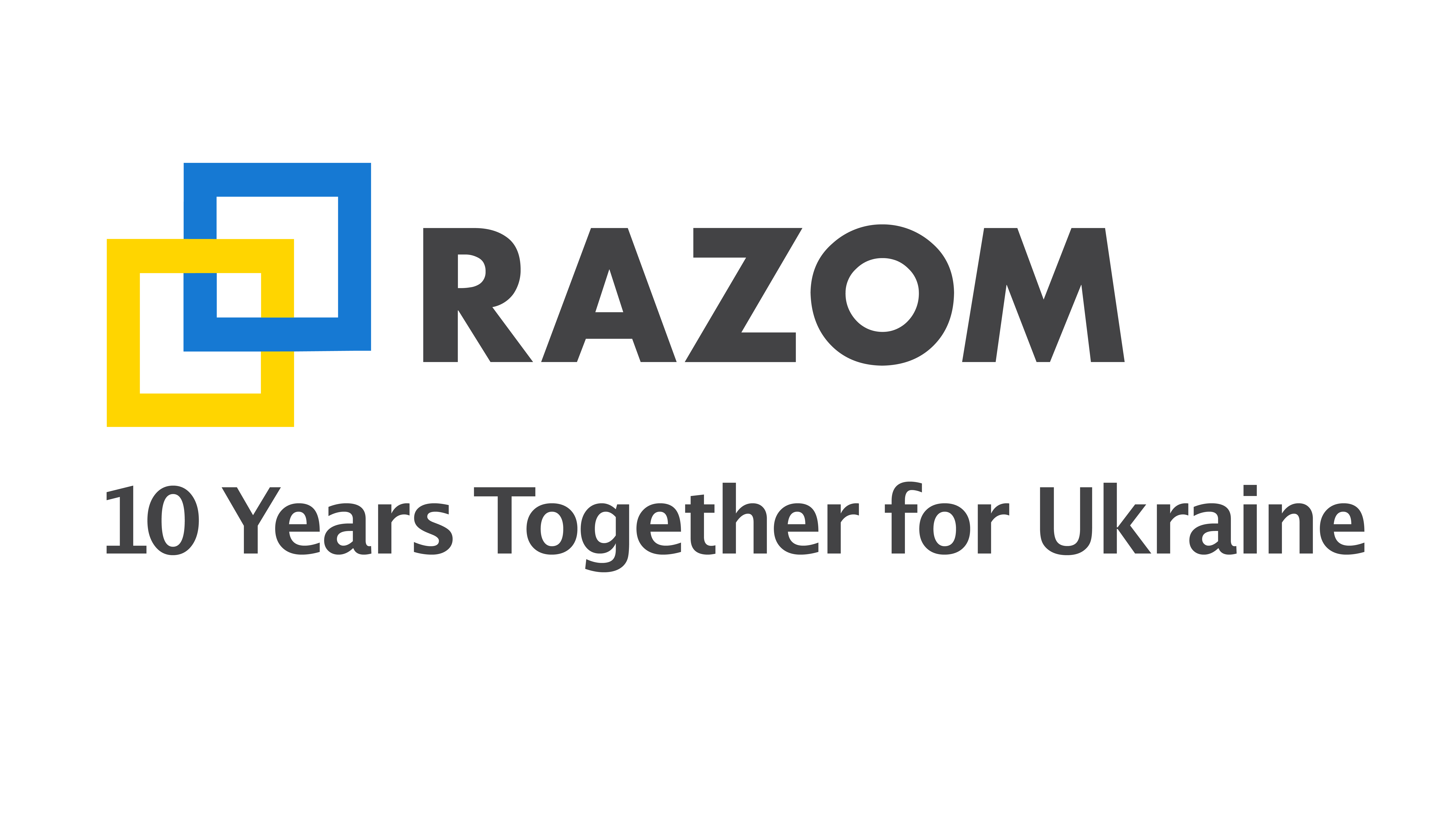Research Project Championing Freedom: Increasing Popular Support for Pro-Democracy Causes
Razom’s Advocacy program is working to enhance engagement with American audiences in order to establish popular, long-term support for Ukraine in the United States.
As part of its advocacy work, Razom received a grant supporting a project titled Championing Freedom. Its purpose was to understand what motivates Americans to support pro-democracy causes and be in favor of government support for a fight for freedom outside the U.S., as in the example of Ukraine.
The Championing Freedom project lasted six-months and examined how Americans, as well as pro-democracy activists around the world, identify with democratic causes. Russia’s full-scale invasion of Ukraine was the case study used to better understand just how Americans think about supporting and defending democracy. The project was conducted in cooperation with Ukrainian civil society groups, global pro-democracy campaigners, friends of Ukraine, and other communicators already working in this space.
The results of the research can be applied by pro-democracy movements to activate popular support for foreign nations under invasion that is committed to preserving their democracy.
Key findings
The key question this research sought to answer is how Americans feel, perceive, and understand Russia’s ongoing war against Ukraine.
The poll conducted in August, 2023 showed that 63% of Americans support continuing military support for Ukraine in next year’s federal budget. The poll, conducted in October, confirmed that 60% of U.S. voters believe that America’s allies and enemies would view a U.S. withdrawal of military support for Ukraine as a sign of weakness.
However, the resumption of the Israel-Palestine conflict introduced a split among the respondents, with some demonstrating less support for military aid to Ukraine if aid is linked to Israel, while others indicated more support.
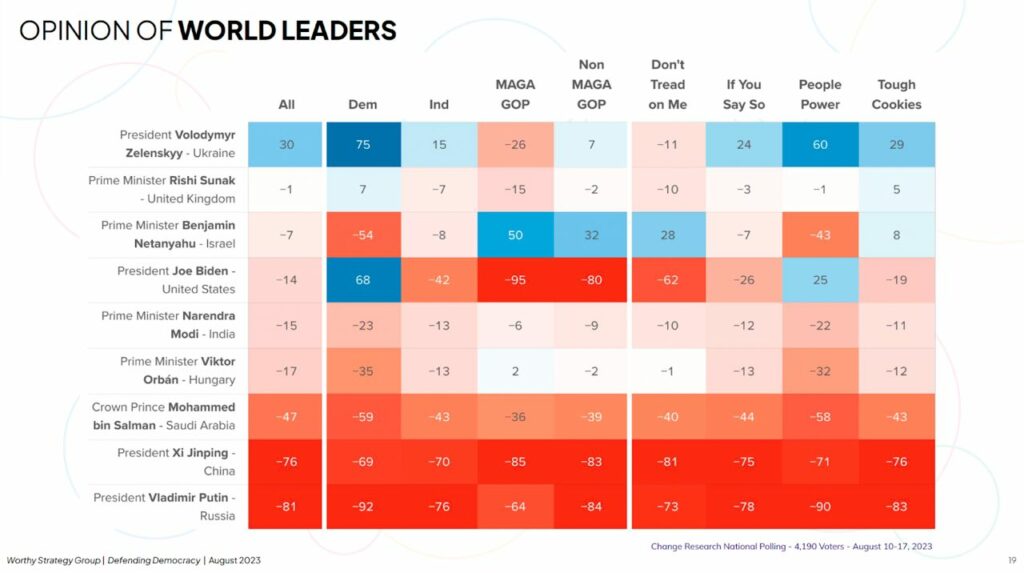
Messages that place Putin as the main villain and mastermind of the war against Ukraine and other conflicts around the world performed best in persuading Americans to support Ukraine.
70% of Americans believe that Ukraine should win the war imposed by Russia — this number holds throughout time — however, they do not see any side currently winning.
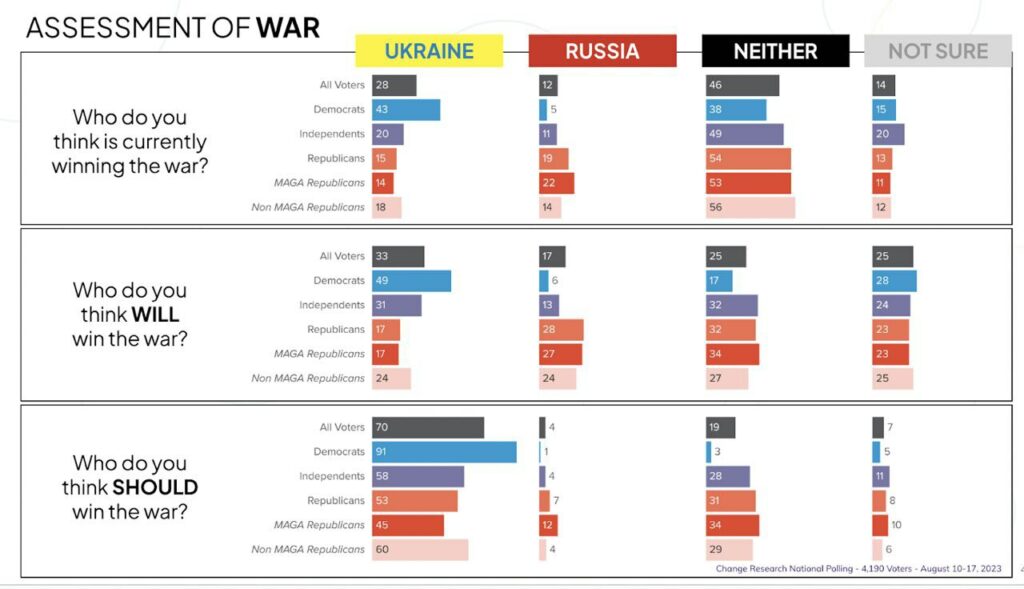
This response is important; winning is crucial for Americans to become invested in any conflict. Currently, Americans do not have a vision of a Ukrainian victory, and shaping that vision would be integral to obtaining popular support in the U.S.
When describing a timeline for the commitment to a struggle, many Americans hear “as long as it takes” as code for “forever”. Proclaiming “victory” as the end goal of aiding Ukraine is crucial to obtaining and sustaining popular support in the U.S.
Survey results indicated that the goal of “defending democracy” lacks broad appeal in the U.S. because different segments of Americans understand the word “democracy” differently. “Defending freedom” unites and motivates Americans more.
Comprehensive interviews with members of the general public indicate that Americans feel that their nation is weak and ineffectual, and are cynical about America’s goodness as a nation. Respondents once again want to feel strong, effective and good. They want their country to lead, but also want that the burden of leadership be shared with the allies. Most think that European allies are not doing their fair share in the war, and should be doing more. Whether it is true or not, this is how Americans perceive their role in the ongoing Russian war against Ukraine.

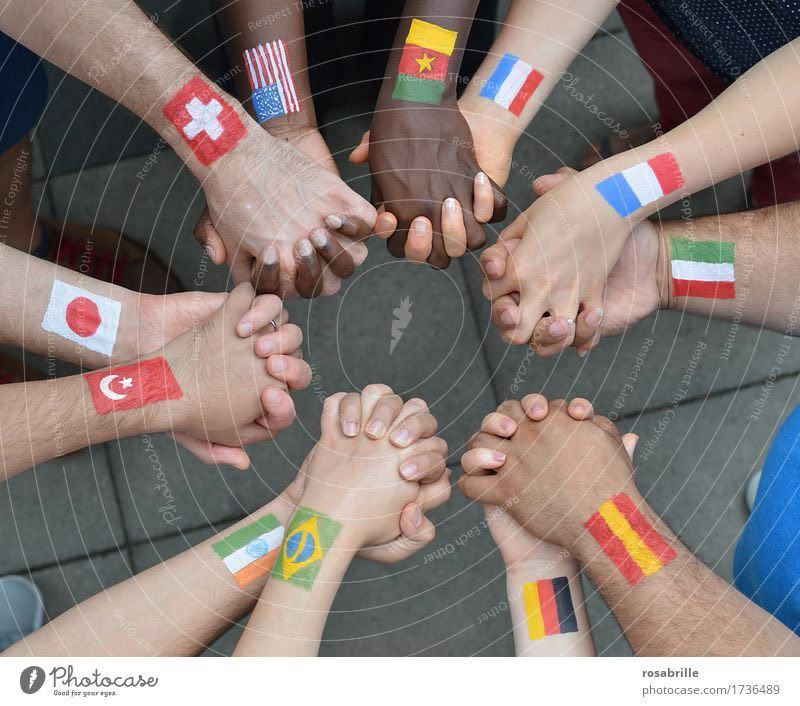
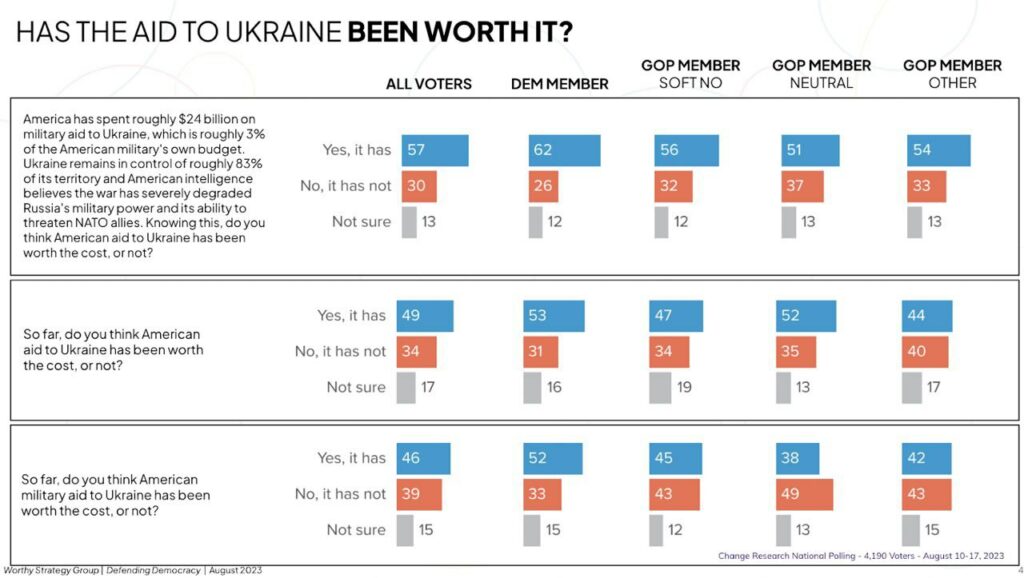
Key arguments
From our research, there are key points Americans need to know to sustain popular support for
Ukraine. Americans need to know the main facts about events in Ukraine,and most do not have accurate information, therefore sharing key arguments is crucial.
Key stories
Beyond polling, another element of this project was a series of deep-dive interviews with a representative group of American voters. When combined with the polling data, a pattern of narratives emerged around how Americans identify with and support Ukraine’s fight for freedom.
Heroic Moments from Shared History
For many Americans, helping Ukraine is a chance for the U.S. to be a hero to the world, just as in World War II. The American Revolution of 1776 is sacred to both Americans and Ukrainians. Describing Ukraine’s fight as a revolt against Russia’s colonial domination—or Ukraine’s own “1776 moment”— can inspire Americans and make them more closely identify with Ukraine.
Respecting Order, Protecting Innocents
Many Americans are deeply offended and moved by Russia’s abuse of innocent lives: the bombing of civilians, abduction of children, rape of women, and other war crimes. They need to hear the stories that bring to life Russia’s rule-breaking, use of torture, and targeting of civilians beyond more abstract claims that Russia is “violating international law.” Narrating the suffering and bravery of Ukrainian civilians living in Russian-occupied areas gives Americans a better understanding of Ukraine’s stake and motivation in this war.
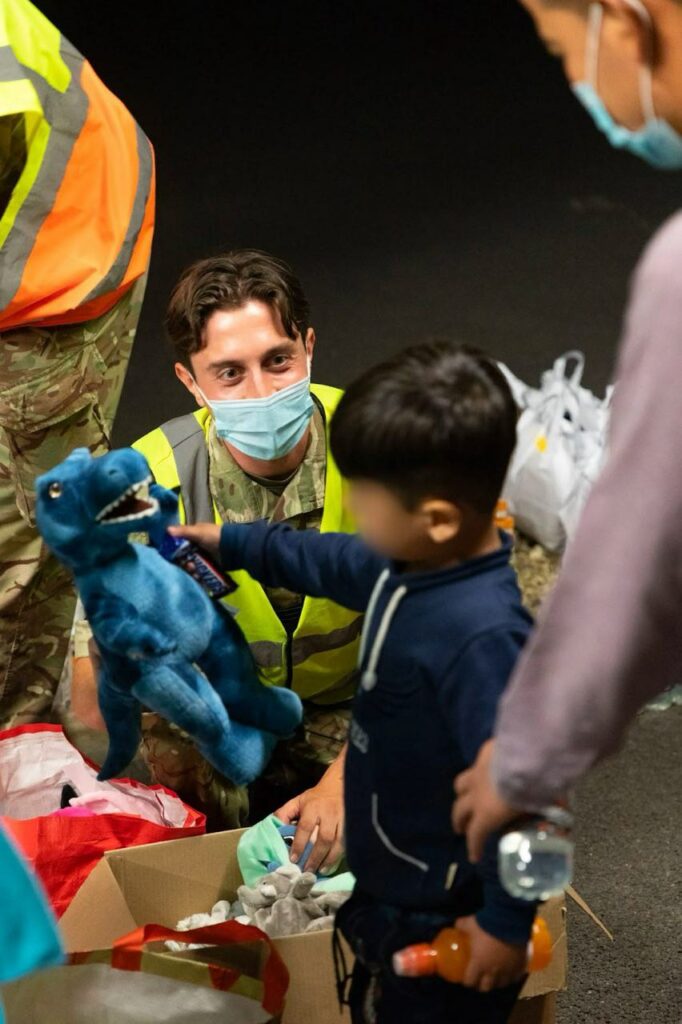

Doing What’s Right *
Narratives about America’s fundamental desire to oppose evil and fight for good; America’s role as the world’s most powerful nation should be provided. Stories should narrate fundamental values—the right to safety, security, freedom, and self-determination. When a major power attacks a small nation, most Americans want the U.S. to side with David and beat Goliath.

* America’s stance in the ongoing Israeli-Palestinian conflict, however, detracted from this argument as many Americans see a double standard in how the U.S. has responded to the protection of innocents in the Middle East conflict and Russia’s invasion of Ukraine.
Winning a Safe, Freer Future
The fundamental purpose of Russia’s invasion of Ukraine is for Russia to define the future of humanity: oppression vs. freedom; liberty vs. censorship; impunity vs. the rule of law. Offering a vision of a future where Ukraine’s victory makes the world safer and deters future authoritarian aggression motivates Americans to be more invested in Ukraine’s cause.
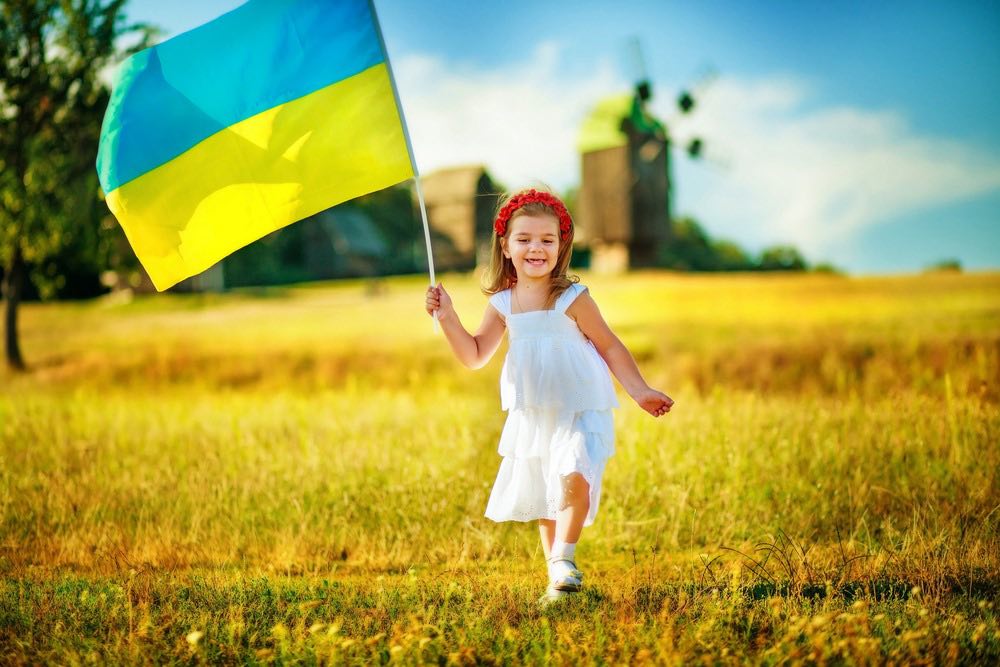
Summary
The research demonstrated that content featuring Putin as an enemy of the free world and the U.S. as a force for good, works for different audiences, especially conservative and independent ones, to amplify support for Ukraine. Since Putin enjoys an extremely low approval rating even among anti-Ukrainian audiences in the U.S., the most universally persuasive messages would focus on him personally.
Based on research insights, Razom, in partnership with Spirit of America, produced an ad that features Col. Matt Dimmick, who went to Ukraine and is an avid advocate in the U.S. of Ukrainian victory.
Overall, Americans’ hearts are in the right place: the majority of people are motivated to support causes to help civilians and vulnerable populations and to safeguard justice and freedom for all. What Americans lack are awareness and reliable facts. Due in part to a competitive information environment, people repeat a set of statements they hear from public figures and in the media (e.g. that the war is a “territorial dispute”, Ukraine is “too corrupt”, the U.S. has given Ukraine a “blank check”, etc.). These types of statements disperse public attention from Ukraine and refocus it on Americans’ deepest anxieties and concerns.
Educational and informative campaigns aimed at boosting awareness about Ukraine and providing Americans with reliable information from resources they trust, are key to securing popular support for Ukraine in its fight for freedom.
This research was conducted in real time and the results were influenced by a fast-moving news cycle. Future research would be beneficial to ensure these findings stay relevant.
Project team
Katya Pavlevych, Project Manager, Razom for Ukraine
Gretchen Barton, Team Lead, Worthy Strategy Group
Kirk Cheyfitz and Rose Hackman, Narrative Development & Strategy, Kirk Cheyfitz/ Political Narrative,
Stephen Clermont, Polling Lead, Change Research
Ellen Kirk, Creative Project Manager
Milan De Vries, Content Testing and Analysis
This research was supported by the Temerty Foundation and Open Society Foundation.

